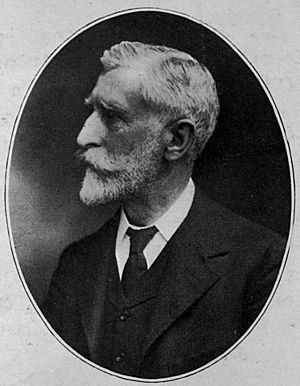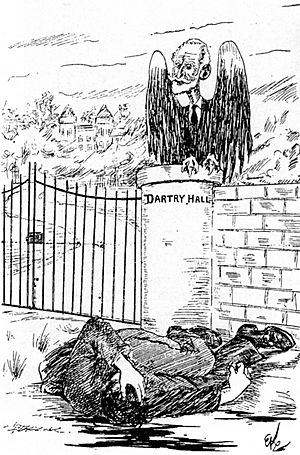William Martin Murphy facts for kids
Quick facts for kids
Willy Martin Murphy
|
|
|---|---|

Murphy, c. 1911
|
|
| Born | 6 January 1845 Castletownbere, County Cork, Ireland
|
| Died | 26 June 1919 (aged 74) |
| Nationality | Irish |
| Alma mater | Belvedere College |
| Occupation |
|
| Known for | Dublin Lockout of 1913 |
| Parent(s) |
|
William Martin Murphy (born January 6, 1845 – died June 26, 1919) was an important Irish businessman, newspaper owner, and politician. He was a member of parliament (MP) for Dublin from 1885 to 1892. During the Dublin Lockout of 1913, some people called him "William Murder Murphy." He was known for owning many newspapers and for helping to develop tram systems in Ireland.
Contents
Early Life and Business
William Martin Murphy was born on January 6, 1845, in Castletownbere, County Cork, Ireland. He went to school at Belvedere College. When his father, Denis William Murphy, who was a building contractor, passed away, William took over the family business.
William was very good at business. He made the company much bigger. His company built many churches, schools, and bridges all over Ireland. They also built railways and tramways in Britain, West Africa, and South America.
Becoming a Politician
Murphy was elected as a Member of Parliament (MP) for Dublin St Patrick's in 1885. An MP is a person elected to represent a group of people in the House of Commons, which is part of the government. He was part of the Irish Parliamentary Party.
In 1890, the Irish Parliamentary Party split into different groups. Murphy sided with the group that did not support Charles Stewart Parnell's leadership. However, Dublin was a strong area for Parnell's supporters. In the 1892 election, Murphy lost his seat to a new politician named William Field.
After this, Murphy tried two more times to become an MP, in 1895 and 1900. But he was not successful because other politicians in his party opposed him.
Newspaper Owner
In 1900, William Martin Murphy bought a newspaper called the Irish Daily Independent. He combined it with another paper, the Daily Nation. In 1905, he relaunched this newspaper as the Irish Independent. It was a cheap newspaper that many people could buy. It quickly became the most popular nationalist newspaper in Ireland. In 1906, he also started the Sunday Independent newspaper.
In 1907, King Edward VII offered Murphy a special award called a knighthood. But Murphy refused it. He had helped organize a big event called the International Exhibition in Dublin. Many Irish nationalists did not like the exhibition because they felt it encouraged buying goods from other countries. Murphy did not want people to think he was trying to get a title or that he was going against his Irish nationalist beliefs.
Murphy often criticized the Irish Parliamentary Party in his newspaper. From 1914, he used the Irish Independent to speak out against dividing Ireland. He wanted Ireland to have more control over its own money and laws.
The Dublin Lockout
William Martin Murphy was okay with traditional trade unions for skilled workers. But he did not like the new, bigger unions that were forming. He was worried that the Irish Transport and General Workers' Union (ITGWU) would harm the Dublin tramways, which he owned.
Because of this, Murphy led the Dublin employers against the ITGWU, which was led by James Larkin. This disagreement led to the Dublin Lockout of 1913. During this time, many workers went on strike, and employers refused to let them work. This made Murphy very unpopular with many people. Newspapers that supported the workers often showed him as a bad person, like a vulture or a vampire.
After the 1916 Easter Rising, which was a rebellion in Dublin, Murphy bought damaged buildings to build new offices for his newspapers. His newspaper, the Irish Independent, called for the leaders of the Rising, Seán Mac Diarmada and James Connolly, to be executed. This made him even more unpopular, especially as many Irish people started to feel sympathy for the rebels. Murphy later said he didn't know about that newspaper article before it was published.
Later Life and Legacy
In 1917, Murphy was invited to talks about the Home Rule Act. This act would give Ireland more self-government, but it had been put on hold. Murphy found out that some politicians were trying to make a deal that would avoid dividing Ireland but would mean Ireland would not have full control over its money. This made Murphy very angry, and he wrote about it in his newspaper. This hurt the Irish Parliamentary Party.
The talks did not lead to a clear agreement. The Irish Parliamentary Party lost power, and a new party called Sinn Féin became more popular. Murphy did not agree with Sinn Féin's ideas for Ireland to be completely separate from Britain.
William Martin Murphy passed away on June 26, 1919. He was buried in Glasnevin Cemetery in Dublin. His family continued to control Independent Newspapers until the early 1970s.
Images for kids
 | Stephanie Wilson |
 | Charles Bolden |
 | Ronald McNair |
 | Frederick D. Gregory |



